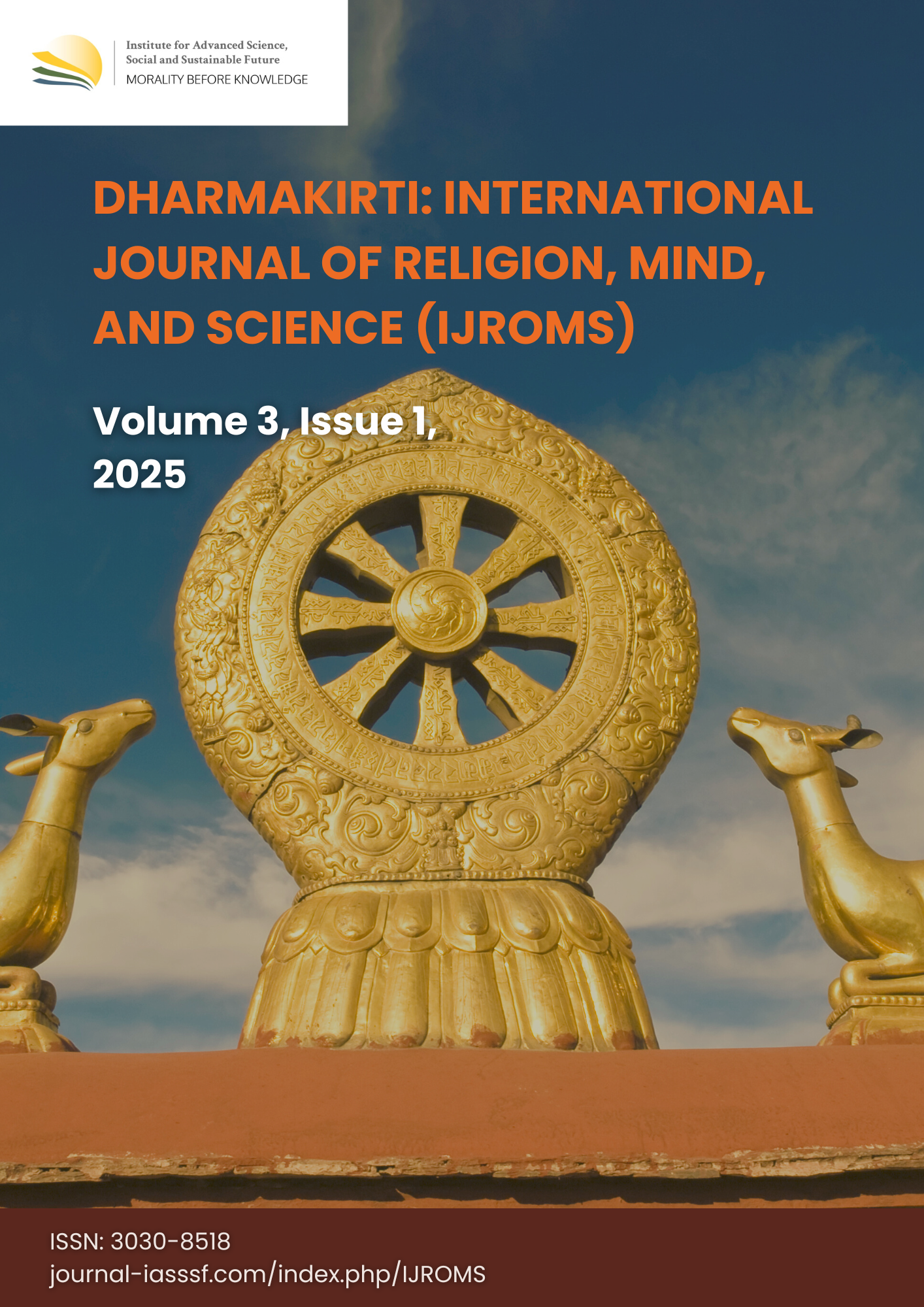
About the Journal
Dharmakirti: International Journal of Religion, Mind, and Science (IJROMS) is a peer-reviewed, multidisciplinary journal dedicated to advancing rigorous scholarship in Religious Studies, Philosophy, Theology, Mind and Cognitive Sciences, and related disciplines. IJROMS published by Institute for Advanced Social, Science, and Sustainable Future (IASSSF), Jakarta, Indonesia, with e-ISSN: 3030-8518. Independent of any institution, sectarian school, or doctrinal affiliation, IJROMS provides an open, critical forum for the scientific, philosophical, and social-scientific exploration of religion in its many forms.
The journal encourages interdisciplinary dialogue and publishes original research articles, symposia, book reviews, and critical discussions that examine the conceptual resources, textual traditions, and lived practices of global religions.
Through a double-blind peer review process, IJROMS ensures scholarly rigor, intellectual diversity, and global relevance. The journal seeks to foster critical-constructive engagement with religion, philosophy, and culture, offering a platform for scholars and students to explore innovative perspectives and advance interdisciplinary research.
Aims
IJROMS is dedicated to exploring the intricate intersections between religious wisdom traditions, consciousness studies, and scientific inquiry in addressing fundamental questions about human existence and meaning making. Its goal is to advance understanding of how contemplative practices, spiritual insights, and scientific methodologies can complement each other in investigating the nature of mind, reality, and human flourishing. By providing a platform for rigorous interdisciplinary scholarship, IJROMS aims to foster dialogue between diverse knowledge systems while maintaining academic rigor and promoting research that contributes to both intellectual advancement and practical wisdom for contemporary challenges.
Focus
This journal focuses on research that critically examines the boundaries and convergences between religious traditions, cognitive sciences, and empirical research methodologies. It emphasizes studies that explore consciousness, contemplative practices, and spiritual experiences through both phenomenological and scientific lenses, while respecting the integrity of different knowledge traditions. The focus is on scholarship that advances understanding of mind-body relationships, meaning-making processes, and the role of contemplative inquiry in addressing existential questions and contemporary social challenges.
Scope
This journal seeks to publish a broad range of scholarly articles, including:
- Religious Studies and Comparative Religion: This area explores diverse faith traditions, their historical development, sacred texts, and contemporary practices. We welcome studies that examine both striking parallels and fascinating differences between world religions, with particular interest in work that reveals the living realities of how people practice their faith today across different cultural contexts.
- Philosophy, Theology, and Ethics: This scope embraces profound philosophical and theological inquiries about human existence, moral reasoning, and the nature of the divine. We seek fresh perspectives on ancient debates, innovative approaches to ethics within religious frameworks, and thoughtful explorations of how faith and reason interact in our search for meaning and moral clarity.
- Cross-Cultural and Diaspora Studies: This area examines how religious traditions adapt and transform as people move across borders and cultures. We focus on the dynamic interplay between faith and cultural identity, exploring how religious communities maintain their essential spirit while reshaping themselves in new environments and multicultural contexts.
- Mind Sciences, Technology of Mind, and Cognitive Studies: This cutting-edge field brings together ancient wisdom about consciousness with modern scientific methods. We welcome research using neuroimaging, psychological studies, and other scientific tools to understand how spiritual practices affect our minds and bodies, while respecting both scientific rigor and the subjective reality of spiritual experience.
- Environmental Ethics and Sustainability: This scope explores how different religious traditions understand our relationship with the natural world and our responsibility to the Earth. We seek studies examining how faith communities respond to environmental challenges and what their wisdom traditions teach about sustainable living in our contemporary climate crisis.
- Medicine, Religion, and Bioethics: This area examines the complex intersection of medical science and spiritual care, from traditional healing practices to contemporary bioethical dilemmas. We welcome research on chaplaincy in healthcare settings, religious perspectives on medical ethics, end-of-life care, and the integration of spiritual practices in therapeutic interventions.
- Aesthetics, Ritual, and Semiotics: This scope delves into the sensory and artistic dimensions of religious life, examining sacred architecture, religious art, ritual practices, and pilgrimage experiences. We focus on studies that help us understand how beauty, symbol, and sacred practice work together to create meaning and foster transformative spiritual experiences.
Current Issue

This issue features authors from Indonesia, India, Malaysia, Japan, and Thailand. The authors are affiliated with Universitas Hindu Negeri I Gusti Bagus Sugriwa, UNTRIM International-Bali, STAH Dharma Sentana, Institut Agama Hindu Negeri Tampung Penyang Palangka Raya (Indonesia); University of Delhi, Indian Institute of Technology (Indian School of Mines), Jawaharlal Nehru University, (India); University of Malaya and Seminari Theoloji Malaysia (Malaysia); Kyoto Universit (Japan); and Mae Fah Luang University (Thailand).














